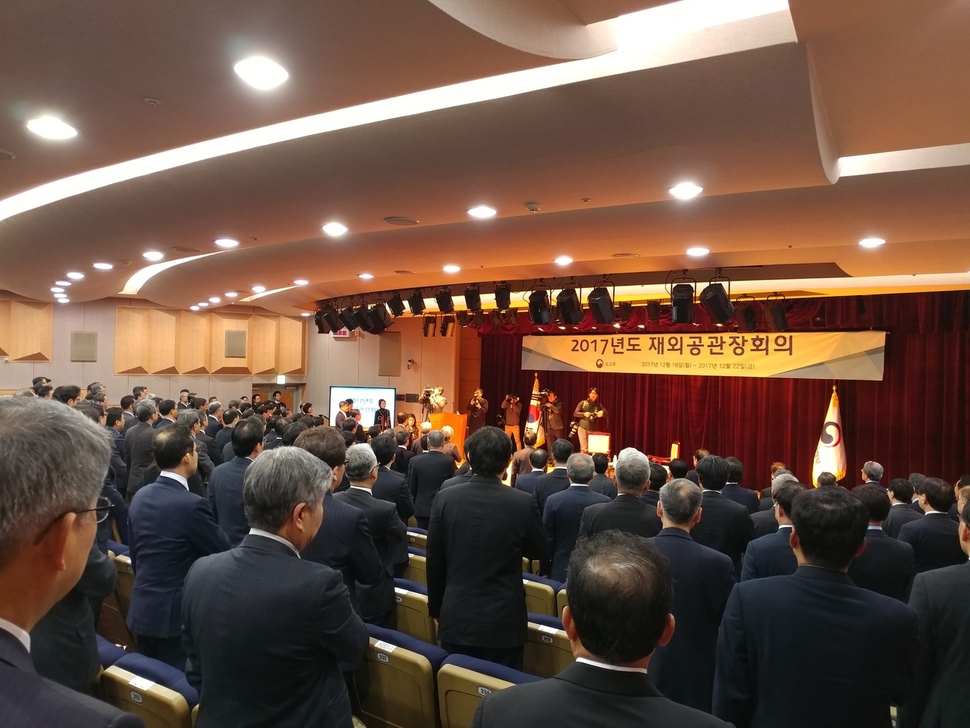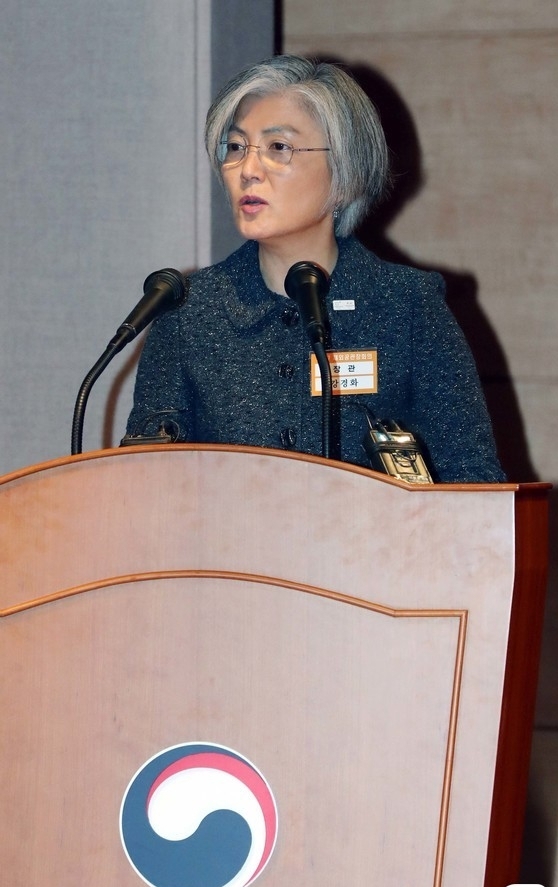Posted on : Dec.19,2017 17:08 KST
Modified on : Dec.19,2017 17:16 KST
 |
|
A view of the 2017 conference of the heads of overseas diplomatic offices that took place at the headquarters of the Ministry of Foreign Affairs, in Seoul’s Doryeom neighborhood on Dec. 18 (by Noh Ji-won, staff reporter)
|
Kang Kyung-wha identifies North Korea, regional cooperation, and diplomatic diversification as areas of focus
South Korean Foreign Minister Kang Kyung-wha said that South Korea would “suppress additional provocations by North Korea with the international community and strengthen its deterrence against North Korea through the South Korea-US alliance.” Kang made these remarks during the 2017 conference of the heads of overseas diplomatic missions that was held on Dec. 18 at the headquarters of the Ministry of Foreign Affairs, in Seoul’s Doryeom neighborhood.
“During the seven months since the Foreign Ministry declared that foreign policy would be focused on the people, the national interest, and capabilities, in line with the new administration, we have been busily working each and every day to address our diplomatic challenges. We are still confronted by various difficulties,” Kang said. During the conference, Kang identified three chief challenges, namely the North Korean nuclear issue, cooperating with the four powers in the region (the US, China, Japan and Russia), and broadening the foreign policy horizon (diplomatic diversification).
Kang addressed the first challenge, the North Korean nuclear issue, as follows: “North Korea has reached the point where it claims to have completed its state nuclear force with the launch of the Hwasong-15 on Nov. 29. The South Korean government and the international community have responded with a joint effort to prevent North Korea from developing nuclear weapons through tough sanctions and pressure on the principle of not tolerating North Korean nuclear weapons while urging North Korea to halt its provocations and quickly return to the table for talks.
 |
|
South Korean Foreign Minister Kang Kyung-wha speaks during the 2017 conference of the heads of overseas diplomatic missions at the headquarters of the Ministry of Foreign Affairs, in Seoul’s Doryeom neighborhood on Dec. 18. (Photo Pool)
|
Kang emphasized that cooperation between the four countries of the US, China, Japan and Russia is one of the tasks required for finding a peaceful solution to the North Korean nuclear issue. The South Korean government, Kang explained, “has fully activated summit diplomacy by arranging a visit to the US two months after President Moon’s inauguration and summits with South Korea’s four powerful neighbors during the G20. During the past seven months, President Moon has engaged in a truly unprecedented amount of summit diplomacy, including his visit to Russia in September, the US President’s state visit [to South Korea] and President Moon’s state visit to China last week.”
Kang singled out the visit to China, which, she characterized as being, “of great significance because it represented a major step toward normalizing bilateral relations, which had been strained by the THAAD issue, before the end of the 25th anniversary of [South Korea and China] establishing diplomatic relations.”
In regard to relations with the US, Kang said that “we will implement the follow-up measures to the South Korea-US summit held in November and will continue high-level deliberations and cooperation.”
In regard to Japan, which is mired in a historical dispute with South Korea over the issue of comfort women and forced labor during the colonial era, Kang said, “We will actualize high-level exchange and communication so that our bilateral relations can develop into a forward-looking and mature partnership that squarely faces history, and we will promote genuine cooperation in a variety of areas.”
As to diplomacy with Russia, Kang said, “We will pursue genuine development of our strategic cooperative partnership by promoting cooperation in the ‘nine bridges’ based on the five frameworks agreed upon during the summit in September. I hope that our ambassadors in these four countries will breathe new life into further developing relations with the countries in which they serve.”
A need for “diplomatic diversification”
Along with diplomacy with South Korea’s four powerful neighbors, Kang also emphasized the need to broaden South Korea’s diplomatic horizon by increasing exchange with countries in Europe and Southeast Asia. “When President Moon gave me my ministerial credentials, he told me that diplomatic diversification was one of our major goals. It’s for the same reason that we included the EU, Germany, ASEAN, India, Australia and Ecuador among the countries to which special envoys were dispatched,” she explained.
“The New Southern Policy that President Moon espoused during his state visit to Indonesia last month expressed this administration’s resolve to greatly upgrade its cooperative relationships with the countries of ASEAN and of Southwest Asia, including India. This will serve as a major pillar of our foreign policy along with the New Northern Policy announced in Vladivostok, Russia, in September, as we seek joint prosperity not only in Northeast Asia but in the surrounding countries and regions. The institutional foundation for systematically promoting these policies is being laid by the Presidential Committee on Northern Economic Cooperation and government-wide initiatives such as the ASEAN strategy team.”
Other points emphasized by Kang were reinforcing the strategic partnership with the EU on the 50th anniversary of the establishment of diplomatic relations with South Korea, arranging a foreign tour for President Moon to coincide with the G20 summit that was being held in Argentina next year, expanding the network of free trade agreements, setting up summits and high-level exchange in Africa and the Middle East while facilitating corporate expansion there, and working to strengthen the diplomatic infrastructure in Africa in collaboration with the South Korea-Africa Foundation.
The conference for the heads of overseas diplomatic missions began on Dec. 18 and will last for five days, bringing together 182 ambassadors, general consuls and other diplomats directing 163 overseas missions around the world. The ambassadors to major powers such as the US, China, Japan and Russia were also in attendance. These diplomats’ itinerary during the conference includes a discussion about the way the government is being run, debates on different topics (public diplomacy and people-centered diplomacy), a visit to the site of the Pyeongchang Winter Olympics, dialogue with young people hoping to go overseas, a visit to a consular call center and volunteer activities.
By Noh Ji-won, staff reporter
Please direct questions or comments to [english@hani.co.kr]










